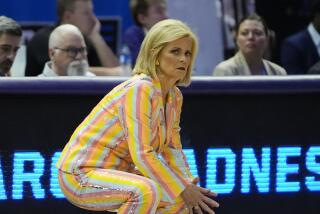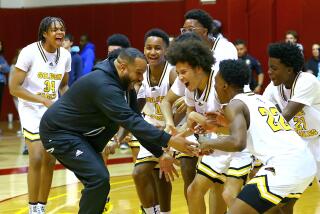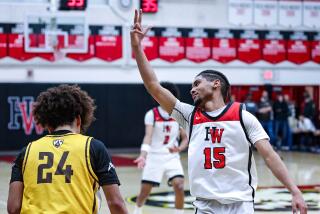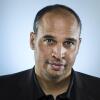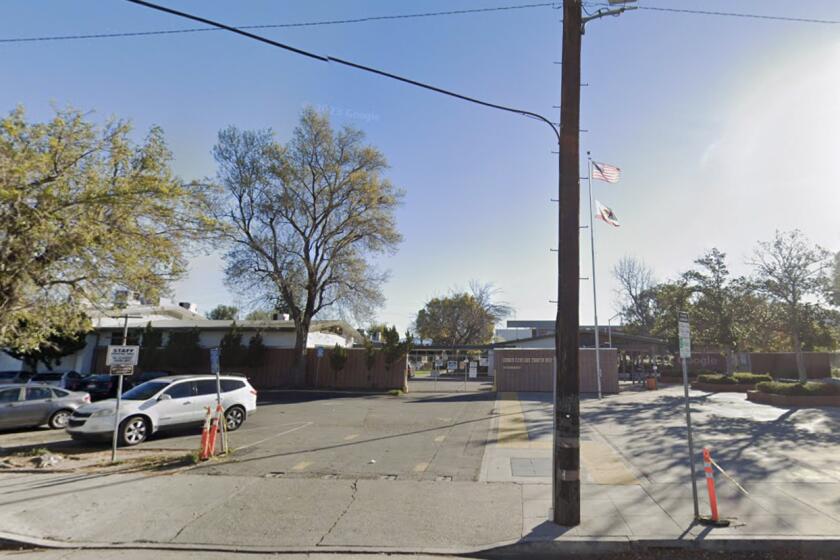2 L.A. high schools, 2 views of Jason Collins
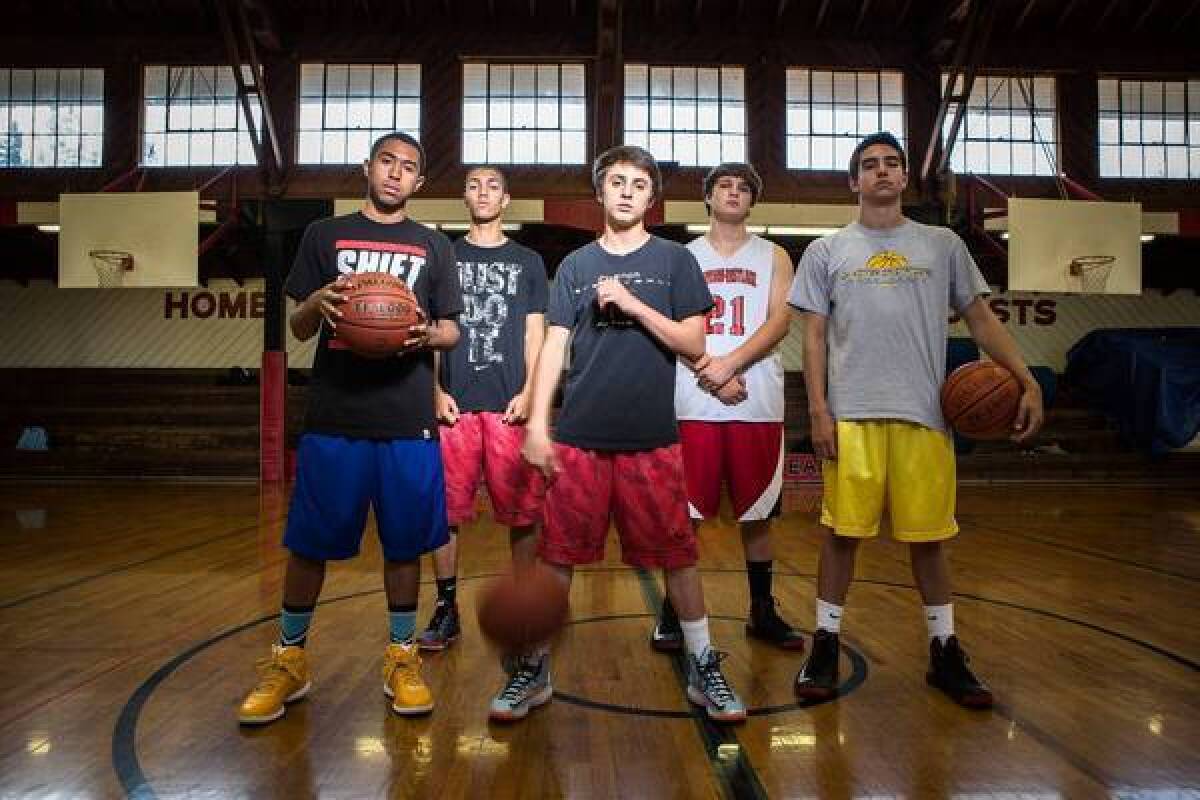
At Harvard-Westlake, a private high school in the shadows of the Hollywood Hills, players from the basketball team heaped praise on the alumnus who this week became the first active NBA player to announce that he is gay.
“We have a lot of pride in him,” Michael Sheng, 17, said of Jason Collins. “He’s a hero, an icon for what he has done.”
Support from basketball players was more tentative at Susan Miller Dorsey High, a school in the heart of Los Angeles’ black community that has long been an athletic powerhouse, producing numerous NFL and NBA players.
“Sure, it’s a sign of progress,” said Myles Thomas, 18. “But is he an icon? Nah. Not to us.”
Collins’ decision to come out this week has reverberated across the country. The initial reaction was overwhelmingly positive, though dissent has emerged on the Internet, talk radio and other media.
That diversity of opinion was evident this week at two high schools in disparate corners of Los Angeles: The reactions from their basketball teams underscore how attitudes toward homosexuality are evolving.
At Harvard-Westlake — where tuition starts at $31,000 a year — gay rights are discussed passionately both on campus and at home. Collins learned how to be open-minded and have his own opinion, said the school’s president, Tom Hudnut.
“He was taught to speak up when things were not right,” Hudnut said. “His education here played a big part in that.”
At Dorsey — where about 70% of students qualify for free lunches — gay rights aren’t a focal point.
Sure, some of the players said, Collins is African American, just as they are, but he grew up in an affluent, mostly white culture that is more likely to accept homosexuality. It’s hard for them to imagine a day when a young male athlete in the inner city would be able to acknowledge he’s gay and be called a hero.
“Change is going to come, you can’t stop it,” said their coach, Kevin Gibson, who has held his job for 23 years. “How long it’s going to take and how much of a change? That will probably be different in every community and every school and every team. It’s a discussion, a work in progress.”
::
Sam Sachs first heard about Collins’ revelation in a Monday morning geography class at Harvard-Westlake. A classmate found out while scrolling through the Internet on a cellphone. Suddenly, Sachs said, a sleepy day grew energized, and the news became grist for school-wide conversation.
No one was more interested than the boys’ basketball players, most of whom idolized Collins, who most recently played for the Washington Wizards, and his twin, Jarron, who also had an NBA career.
“For a Harvard-Westlake alumni to be the first active professional player to come out while still playing? Amazing,” said Sachs, 17.
Sachs’ teammates made clear that having a gay player on their team would be celebrated. The reason, they said, had everything to do with Harvard-Westlake’s culture.
One of the school’s most active on-campus groups is its gay-straight alliance, roughly 50 students strong, according to Hudnut. Teachers, administrators and parents regularly speak about gay rights. Religion isn’t discussed much. If anyone were to come to campus expressing the view that homosexuals are sinners, they’d be met by outrage, said the school’s longtime basketball coach, Greg Hilliard.
“We have a lot less tolerance for people who make reactionary statements like Mr. Broussard,” Hilliard said, referring to ESPN television commentator Chris Broussard, who said Monday that, because of his religious beliefs, he did not condone homosexuality.
“If a guy like that came to this campus, that is where I would have to talk to my guys about the importance of tolerance.… They’d have some hard questions for a guy like that,” Hilliard said.
By coincidence, in mid-April the school held a packed assembly that featured John Amaechi, who came out in 2007, years after he retired from the NBA. The Harvard-Westlake basketball players said Amaechi underscored the message they get on campus every day: Don’t discriminate, don’t label others, gay and lesbian students have strengths and weaknesses just like anyone else.
“Being gay is not an issue here,” said Eric Loeb, 17. His teammates and coach said that other sports at Harvard-Westlake have openly gay athletes. “It shouldn’t be a big deal for us. It shouldn’t be a big deal in society.”
::
Many at Dorsey had never heard of Collins, a 34-year-old foul-prone center who rarely makes the sports highlight shows. Nor did they especially care about his revelation. Coming out isn’t discussed with fervor here. Dorsey’s small gay-straight alliance was shut down this year when the teacher who ran it left the school, said Assistant Principal Jeremy McDavid.
Collins certainly grabbed the attention of the basketball team, though. Players have been hanging out in their coach’s office all week, hashing out their views with Gibson, who has embraced the revelation as a teachable moment. “There’s a lot of talk, a lot of different opinions on it,” said La’Roy Alexander, 18. “It’s complicated.”
Part of the complication, the players said, springs from the conservative religious views held by many of the students and parents.
“I’m a Christian,” said Dontrel Slack, 18. “So all we were taught was boy and girl together, that is the way to go. You don’t really hear about boys and boys liking each other. Being a Christian, that is what we believe in, boys and girls.”
All but one player agreed. “I’m a Christian,” said 17-year-old Jordan Bryant. “But I also feel that God created you to be what you can be. If He created you with an intent to like another male, then that is what you were created to be.”
Nobody on the team would bully or tease a gay student or athlete at the school, each player vowed. But would they accept a gay teammate?
“If you can hoop, you can hoop,” said Thomas, a line repeated by several others. “If you’ve got skills, you’re going to be good with us, no matter what.”
There was, though, a caveat.
“You have to be who you are because living a lie, that could kill you,” Thomas said. “So we understand the need to be open about things.... But at the same time, if you are on my team, don’t bring that stuff around me.… Handle your business on your own time.”
More to Read
Start your day right
Sign up for Essential California for news, features and recommendations from the L.A. Times and beyond in your inbox six days a week.
You may occasionally receive promotional content from the Los Angeles Times.
